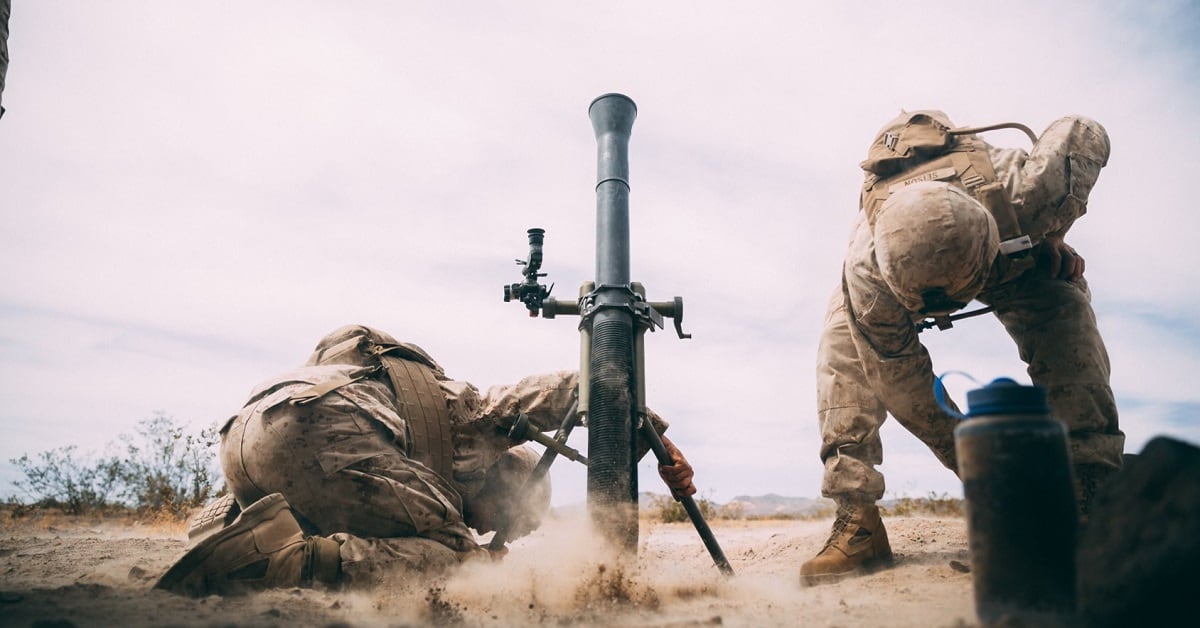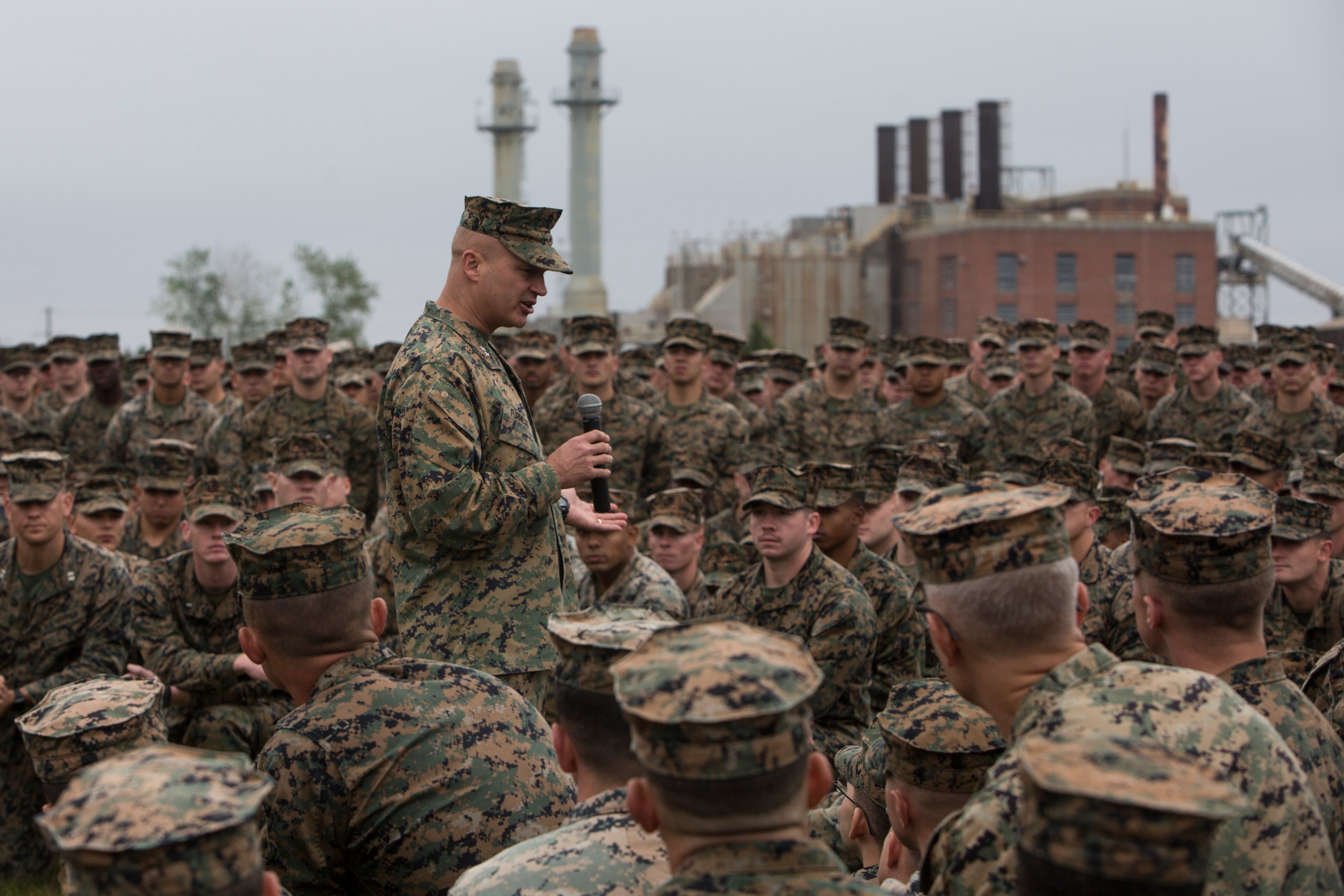CAMP LEJEUNE, N.C. — When the commanding general of the 2nd Marine Division sent out a letter to his Marines citing the “significant decline in the basic discipline of our warriors,” opinions flew.
And, of course, rumors.
Some rumors circulating the barracks at Camp Lejeune, North Carolina, are partially true.
It did happen in a Camp Lejeune chow hall a few weeks ago that the commandant of the Marine Corps ran into a division Marine who was “in pajamas.”
But it wasn’t that one unfortunate instance that caused the commanding general of 2nd Marine Division to put in motion plans to refocus the division, as insisted on by the excitable rumor. There are “a hundred different” examples he could share, Maj. Gen. David Furness told Marine Corps Times in an exclusive interview.
But for Furness, who had been traveling at the time of the chow hall blunder, receiving a letter from the commandant’s office about the incident didn’t help.
Neither did the time the major general, who started his career as a rifle platoon commander and 81 mm mortar platoon commander in the 2nd Marine Division, approached his two-star parking space with two lance corporals sitting on a bench in front of it.
The general walked by them, he recounted. And when the junior Marines didn’t acknowledge him, he greeted them.
One Marine totally blew him off — didn’t get up or acknowledge him, he said.
“The other one looks up, and, while sitting, salutes with an iPhone in his ear.”
The general asked them: Were you ever taught to do that in boot camp?
“No sir.”
“Why did you try to do it?”
“I was on the phone.”
“Why are you on the phone here?”
“I don’t know.”
Spot correcting was his first tactic when he took over the division in August, Furness says. But it hasn’t been effective.
And the correction shouldn’t be coming just from him, but from all his Marine leaders. Which is not something he says he has always been seeing.
On April 16, Furness fired off a policy letter to the entire 2nd Marine Division detailing a new “basic daily routine” for North Carolina division Marines.
“We have allowed Marines and Sailors to walk around with long hair, nonexistent or poor shaves, unserviceable boots and utilities and improper civilian attire,” the letter reads. “There are weeds growing around our building and work spaces and trash everywhere but the dumpsters where it belongs.”
“A general lack of attention to detail and corrective action by peers and leaders results in lower discipline and destroys the foundation on which the Marine Corps was built — ironclad discipline.”
The letter, and its accompanying “basic daily routine” hourly schedule, went viral among Marines.
The “old Corps” came forward, asking what happened to their beloved Marine Corps and lamenting that “ironclad discipline” they remember.
Many other Marines responded the opposite way, sending accusations of micromanagement at the highest levels: angrily alleging that this is an antithesis to the Marine Corps motto of “centralized command, decentralized control,” and asking why should killers really care about haircuts?
RELATED

Fingers came back to point at Furness.
As one retired gunner said on Facebook: It was a “vitriolic social media dog-pile.”
Furness says he regrets how the initial rollout went. The Luddite commanding general who doesn’t use social media sheepishly said he didn’t realize the letter would get out of the unit.
He wouldn’t do it like that again, he says, but he’s not backing down.
From June 3 through June 7 there will be an entire division stand down. It’s more of an educational stand down, he says, to teach Marines what the right way looks like and show how to best and most effectively enforce Marine Corps standards.
Basically, to teach what they already learned in boot camp.
It’s not coming from just him. In September 2018 he formed a “sergeants council” of about 12 Marines pulled from across the division to bring to the table issues they see on the ground.
Right now the council, which meets monthly, is focusing on planning the June stand down. After that, there will be quarterly division stand downs.
The commanding general says it’s a time to pause and get it right — a luxury the Marine Corps hasn’t had until recently due to a high deployment tempo.

“I will tell you I went to a chow hall today and from the car to the door I picked up a straw, five cigarette butts, a top of some drink beverage and some indescribable piece of trash,” Furness told Marine Corps Times April 26, comparing the distance to the short hallway leaving his Camp Lejeune office.
“Now, in the Marine Corps I grew up with people would be asking why is a CG picking up trash?”
“Well, I’m part of the team, No. 1 — I want to set the example.”
But he also wants Marines to “have pride” in their surroundings. And pay attention to detail.
It’s about more than just haircuts, Furness says. He believes lack of discipline in garrison will carry over to training and eventually combat.
It’s already being seen in training, he says. The after-action reviews he has been receiving from California service-level exercises at Twentynine Palms, California, and the Mountain Warfare Training Center in Bridgeport, California, are uniformly marking Marine performance as “woefully inadequate,” Furness said.
But it is still pretty unique for a commanding general to take such hold from up high. And, it begs the question: What is going on in 2nd Marine Division?
The commanding general didn’t say exactly what happened to the pajamaed Marine in the chow hall: But he knows that Marine got a call from the sergeant major of the Corps.
Furness’ big regret is that he didn’t get a letter and contingency plan out sooner.
“I’m upset with myself for not doing this quicker, giving more specific guidance to my junior leaders and my leaders sooner so that they could have gone after this.”
“But, again, this is a Marine Corps problem, not just a 2nd Marine Division problem, but we’re the ‘follow me’ division, and I’m stepping out.”
Boot bands don’t make killers
The issues in 2nd Marine Division right now are not unique to East Coast Marines, Furness says.
He insists that he and his peers have been lamenting about a lack of discipline crawling across the Corps for the past 10–15 years.
And it is at the small unit leader level that he’s looking to the most.
“I absolutely believe it’s incumbent on the leadership of those units to make them adhere to the Marine Corps standards, because part of the pride of being a Marine is being better than everybody else,” he said. “I’m not asking anyone to do anything that’s not Marine Corps order … or part of the Marine Corps culture.”
Several responses to the letter have been angry, calling Furness’ tactic an out-of-line takeover.
A recent anonymous opinion article reportedly from an active-duty Marine in combat arms on the military website Task & Purpose was titled, “The ‘micromanaging’ Marine general should focus on strategy, not mustaches.”
That junior Marine officer started the letter by telling Furness, “Your latest policy letter … violates the core tenants of Marine Corps doctrine. You ought to repeal it immediately.”
Proper shaves and poorly maintained facilities are noteworthy, “but these things are not essential,” the Marine wrote. “You can kill enemies with long hair. You can win battles without boot bands or rolled sleeves. At the end of the day, grooming standards have only tangential relevance to victory in war.”
“This petty stuff higher ups worry about is the reason why good, effective Marines get out,” a five-year enlisted Marine who got out of the Corps in the past year told Marine Corps Times.
From an initial read, Furness’ letter does look like a mandated schedule.
“I expect EACH AND EVERY Marine and Sailor to fully embrace the following routine,” it stated.
But the general backtracked on that wording of his letter, telling Marine Corps Times there is no micromanaged schedule, it’s a traditional schedule for small unit leaders to base their unit schedules off of.
“That plan is not a division-wide schedule,” he said. “It’s a schedule. So if they want to adopt it, you know, verbatim, that’s their decision.”
“It’s not a mandated, by the hour schedule.”
Several Marines at Camp Lejeune, North Carolina, said they thought the division’s response to the letter seems to be pretty split, maybe even 50/50.
A couple Marines mentioned there is now more traffic getting on base in the early morning hours. Earlier start times and mandatory physical training each morning the cause.
Other 2nd Division Marines say “literally nothing” has changed in their units.
According to 1st Lt. Nathaniel Thompson, with Charlie Company, 2nd Combat Engineer Battalion, there had been notice of some units coming in late or leaving early, or taking long lunches.
But, for a well-disciplined unit, there hasn’t been much change, especially on the side of a daily schedule.
“The good units are already doing this, and they will continue to do this,” Thompson said.
So why the fierce push-back?
Max Uriarte, the creator of Terminal Lance, was the first to post Furness’ letter publicly, on his outlet’s Facebook page.
“I think the fundamental problem that junior Marines have with things like this is that 99 percent of them are doing the right thing, but are being punished because of the 1 percent that are not,” he said.
Punishing an entire division is odd, Uriarte said, noting that he personally never had seen that before.
“Had it not blown up on social media, it probably would have just been a few weeks of butt-hurt SNCOs passing down punishment and would have faded off eventually.”
“Mass punishment events like this spring up all the time, and serve as a regular reminder to look forward to your DD-214,” Uriarte said.
Though the Commandant of the Marine Corps Gen. Robert Neller did not respond to requests to comment on the chow hall incident, Furness did hear from him after his letter went out.
Neller had been Furness’ division commander in combat: The commandant was calling to ask if the division commander was alright.
“He said he supported what I was doing and just wanted to make sure I was doing OK. He was just checking on one of his Marines.”
Which is what Furness insists he is doing here: leading from the front and coaching a team of Marines to success.
When Furness was a child, he wanted to be an outside linebacker for the Minnesota Vikings, he said.
“It just didn’t work out that way.”
But the father of four compares leadership a lot to coaching a sports team.
The consequences in the Marine Corps are a lot greater.
“I hate it when I hear analogies of the NFL or something, ‘It’s like war out there,’” he said. “No, it’s not. Nobody out there is going to get their head blown off this morning.”
But, like being a part of the New England Patriots, he said, or any other professional football team, there is a culture. And there are parts of that culture that help lead to being champions.
The Marine Corps is no different, he said.
“When you do that and you give of yourself and you embrace that culture and become a full member of it, there’s a certain pride associated with that,” he said.
“And then the biggest championship you can win is going to combat, accomplishing the mission and bringing everybody home.”
Andrea Scott is editor of Marine Corps Times. On Twitter: _andreascott.
Andrea Scott is editor of Marine Corps Times.





